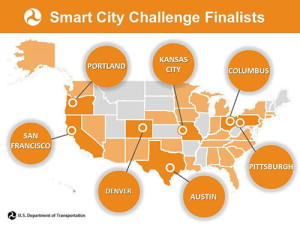Mayor Steve Adler will be in Washington, DC on Monday and Tuesday of next week to continue preparations for Austin’s final submission to the Department of Transportation Beyond Traffic: Smart City Challenge. The announcement of Austin’s inclusion as a finalist for the Smart City Challenge during the South by Southwest festival has energized our community, and Mayor Adler is seeking to capitalize on the momentum to realize the opportunity to become the city that shows the rest of the country how to use technology to make mobility safer, cheaper, cleaner and more effective for everyone.
“The Smart City Challenge is a rare opportunity to foster innovation where we need it most in the city that does it best,” said Mayor Adler. “No city is better suited to realize the potential of the Smart City Challenge, and no city needs the technology solutions more.”
 Austin is one of seven finalist cities competing for the Department of Transportation’s $50-million Beyond Traffic: Smart Cities Challenge to create “fully integrated city that uses data, technology and creativity to shape how people and goods move in the future,” according to a DOT statement. The winning city will do this by using technology to transform urban mobility by better using data, implementing driverless vehicles, and making the use of electric vehicles more widespread, among other strategies. When the Department of Transportation announced the competition in 2015, 78 cities applied; Sec. Anthony Foxx announced the seven finalists in Austin at SXSWi. The final applications are due in late May, and the winner will be announced in June.
Austin is one of seven finalist cities competing for the Department of Transportation’s $50-million Beyond Traffic: Smart Cities Challenge to create “fully integrated city that uses data, technology and creativity to shape how people and goods move in the future,” according to a DOT statement. The winning city will do this by using technology to transform urban mobility by better using data, implementing driverless vehicles, and making the use of electric vehicles more widespread, among other strategies. When the Department of Transportation announced the competition in 2015, 78 cities applied; Sec. Anthony Foxx announced the seven finalists in Austin at SXSWi. The final applications are due in late May, and the winner will be announced in June.
In DC, Mayor Adler has meetings scheduled with the congressional delegation, Sen. John Cornyn, the White House, representatives of Daimler North America Corp., General Motors, Ford, Continental Automotive Systems, Leidos, NXP, Amazon Web Services, the Intelligent Car Coalition, and AAA, though the Mayor’s schedule is in flux and more meetings are being added at this time.
Austin’s proposal, which is based on many projects that are currently underway, imagines using “big data” to create traffic lights that automatically adjust to weather, traffic flow, and accidents, as well as personalized, automatic traffic reports based on your commuting patterns. In the first round, Austin also proposed electrifying the city vehicle and taxi fleets, a pilot project for a driverless shuttle bus at the airport, as well as one-stop-shopping transportation hubs and mobility passes.
“Austin has a mobility problem, but we also have advantages – a leading tech sector, a creative culture, a commitment to innovation, a vibrant economy, and a fierce sense of who we are – that few other cities in the world have,” said Mayor Adler. “Winning the Smart Cities Challenge would help us implement these technological innovations faster, bigger, and better, but win or lose, we’re doing this. Innovation is in our DNA in Austin, and we desperately need the solutions that innovation can bring.”
This week, Mayor Adler attended the World Economic Forum meeting in San Diego on transformation in urban mobility. DOT Sec. Anthony Foxx provided an update on the Smart City Challenge, and many of the mayors of the seven finalists cities also attended.
-30-
